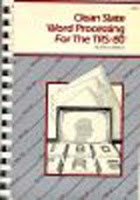DRM. Forget what its intials mean. Who cares. What it is, is crystalized copyright.
Back when I first dabbled with computers (IMSAI–I mean ancient), software was all hand-coded and freely exchanged among like-minded tinkerers. The only software you bought came from the kit manufacturers, and was really just another part like the power supply. But quickly, the idea of software as a product popped up. My first attempt at the genre was a version of Conway’s Life I wrote, coded, and sold as a cassette. My biggest was the Clean Slate Word-Processor for the TRS-80, sold through Howard W. Sams publisher.
 While neither had any copy-protection features, I was already well aware that software’s origins had bred the culture of cheerful piracy. I tackled the issue by linking legal sales of my word-processor with wonderful documentation, full source code and design discussion. Other issues, related to the immaturity of the software publishing industry and the birth of the IBM-PC, sank the project after a year’s sales even with wonderful tech reviews, and I moved back to my first love, writing fiction.
While neither had any copy-protection features, I was already well aware that software’s origins had bred the culture of cheerful piracy. I tackled the issue by linking legal sales of my word-processor with wonderful documentation, full source code and design discussion. Other issues, related to the immaturity of the software publishing industry and the birth of the IBM-PC, sank the project after a year’s sales even with wonderful tech reviews, and I moved back to my first love, writing fiction.Hard drives accelerated the rate of piracy, and as other digital items like ebooks, music files, and movies were born, the learned disrespect for copyright spread there too. Somewhere in the process, copy-protection was born. It had to. Respect for copyright laws had been severely damaged.
 If people respected copyright, there would be no DRM. If there were perfect DRM, there would be no need for copyright. They are inversely related. (See my fake chart.) The various media crackers who rant about DRM are the reason for its existence. I see perfect DRM as being transparent as air for a legal buyer, for any use, and giving no ground for the thief. Current DRM that keeps the legal user from what he purchased is ugly.
If people respected copyright, there would be no DRM. If there were perfect DRM, there would be no need for copyright. They are inversely related. (See my fake chart.) The various media crackers who rant about DRM are the reason for its existence. I see perfect DRM as being transparent as air for a legal buyer, for any use, and giving no ground for the thief. Current DRM that keeps the legal user from what he purchased is ugly.Of course that’s just a two-dimensional view of the situation. There are big dollar commercial enterprises that could not survive, nor produce product, if piracy is rampant. There are also smaller producers who can play the percentage games and gain viral advertising by leaving their products easily copyable. And of course there are many who give away their material freely for their own reasons. I’m down in the lower end of that scale, I have several free tales available on my website, partly to let people know my site exists, and partly because I would rather people enjoy the stories for free rather than let them bit-rot in my backups. My current experiment with a free podcast of a new novel is an effort to let people know that it exists so they will buy it once it hits the marketplace.
But, my relaxed stance on DRM for my ebooks is just a reflection of my small-fish position in the marketing pool. If it were reasonable to do so, my ebook versions would be sold without any DRM, but many market vendors require it. But that doesn’t mean I have any respect for the cracker who cheerfully steals his media, leaving the legal buyer to pay more to shore up his habit.
The best of all situations is like what has evolved in the music arena. From ugly DRM came the friendly iTunes DRM. As the market expanded to include people who are quite comfortable respecting copyright and paying for what they use, the DRM has dropped away. It’s an inverse relationship. For that to happen in the ebook and movie areas, the market has to expand and the cheerful crackers have to retreat to a little criminal niche. We need simple markets with standardized file formats with friendly DRM, where it’s easier to click the buy button than to track down the cracked versions. When we can reach that level of legal sales, I feel the DRM will drop away, an unnecessary expense, like it did with music. The DRM crackers are just delaying that day from coming.